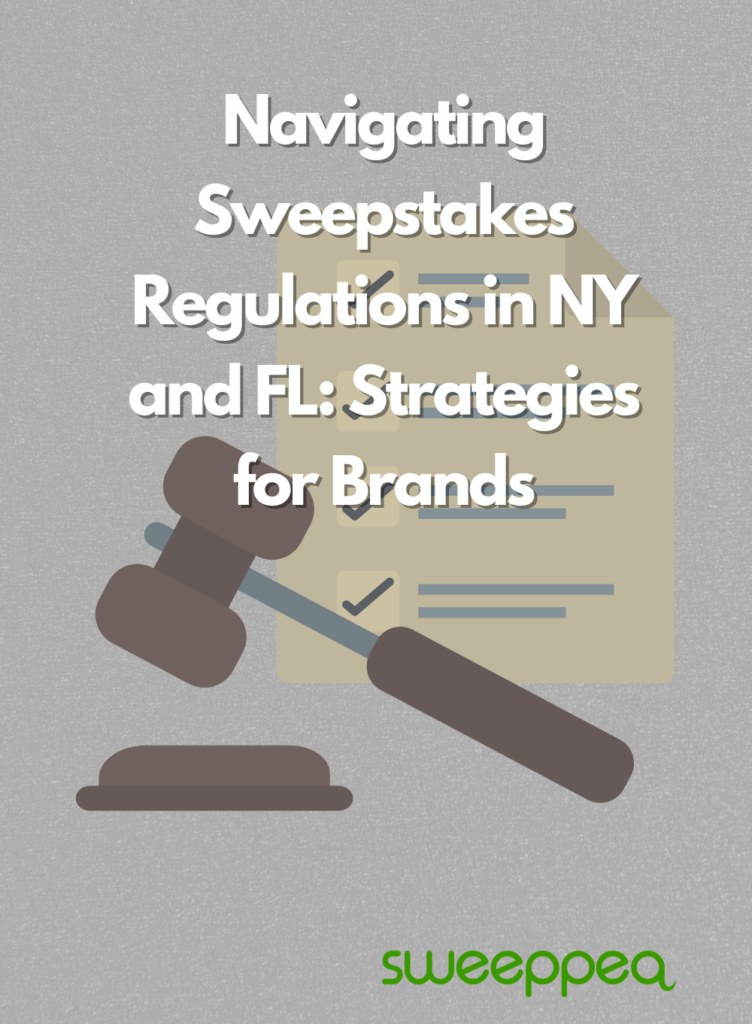
Navigating sweepstakes regulations in New York (NY) and Florida (FL) poses a complex challenge for sponsors, businesses, and merchants. They must follow various rules to ensure compliance and avoid legal issues. Understanding each state’s specific regulations is important for running legal and effective sweepstakes campaigns.
Sponsors need to comply with registration requirements, prize restrictions, disclosure statements, and winner notification procedures. Non-compliance can lead to fines, legal actions, and damage to the brand’s reputation.
In this article, we discuss key strategies for NY and FL sweepstakes compliance. Following these strategies will help run successful, legally sound campaigns that engage participants and drive results.
Understanding Bonding and Registration Requirements
Sweepstakes regulations in NY and FL often require brands to bond and register their sweepstakes campaigns in these states if the total retail value of the prize or all prizes combined is more than $5,000.00. These requirements play a pivotal role in ensuring the integrity and fairness of sweepstakes, safeguarding both participants and sponsors. The bond and registration come as an added cost to the sweepstakes campaign.
Bonding: Essential Safety Measure for Participants
Sponsors provide a bond equal to the total value of the prizes in bonding. This bond acts as a financial guarantee, assuring participants that the sponsor will award the promised prizes. In unforeseen circumstances, the bond serves as a safety net, reinforcing the sweepstakes’ credibility and, in turn, the brand’s reputation.
Understanding bonding’s intricacies matters since non-compliance can have legal consequences. Participants need to trust that the sweepstakes are legitimate and that sponsors will award prizes as advertised. By meeting bonding requirements, sponsors build essential trust and credibility for successful sweepstakes campaigns.
Registration: Navigating the Regulatory Landscape
Registration is a critical aspect of sweepstakes compliance. Sponsors must submit detailed information about their sweepstakes to state authorities which includes prize details, the sweepstakes’ duration, and entry methods.
In NY and FL you’ll need to submit information accurately and timely to align with state regulations and minimize legal risks. This demonstrates the sponsor’s transparency and dedication to compliance, nurturing a positive relationship with regulatory authorities.
Integrating Bonding and Registration for Compliance
Bonding and registration work in tandem to create a robust framework for sweepstakes. The bond acts as a financial commitment, while registration ensures that the campaign is transparent and abides by state regulations.
Challenges may arise for sweepstakes administrators in navigating these requirements. Complexities can range from calculating the appropriate bond amount to compiling the necessary registration information accurately. Acknowledging these challenges and seeking professional guidance like Sweeppea’s can be instrumental in ensuring a seamless and legally sound sweepstakes experience.
How to Avoid Sweepstakes Bonding and Registration in Florida and New York
1: Lowering the Prize Pool
One effective strategy to navigate sweepstakes regulations in NY and FL is to lower the prize pool. By decreasing the total retail value of offered prizes to $5,000 or less, sponsors can simplify bonding and registration requirements. This can involve offering smaller prizes or limiting the number of high-value prizes.
Trimming the prize pool to $5,000 or less eliminates bonding and significantly reduces bonding and registration obligations. Smaller or fewer high-value prizes ease the administrative burden of compliance, making regulatory navigation more straightforward.
This approach also offers a cost-effective strategy. Sponsors can use resources more efficiently, avoiding unnecessary financial burdens. It ensures a lean resource use while upholding the sweepstakes’ integrity.
However, while seeking regulatory benefits, sponsors need to balance participant engagement. Careful prize valuation and creative design are crucial. Offering unique, exclusive, or practically useful smaller prizes can maintain participant interest.
Strategy 2: Limiting the Number of Winners
Brands can strategically manage sweepstakes campaigns by limiting the number of winners.
This involves setting a cap on winners so the total value of the prizes awarded does not exceed $5,000. If the sweepstakes total prize(s) pool is $5,000 or less, there is no requirement to bond and register in New York and/or Florida.
Additionally, fewer winners help manage costs and reduce the administrative workload associated with prize fulfillment. By determining a fixed number of winners, sponsors can control the campaign’s scale more effectively.
Strategy 3: Geographical Exclusion of NY and FL
Businesses can also leverage the alternative strategy of excluding participants from NY and FL to simplify compliance with sweepstakes regulations. By excluding these states, they avoid the specific legal requirements unique to them.
This geographical exclusion strategy involves clearly stating in the sweepstakes official rules and promotional materials that residents of NY and FL are ineligible. This approach lets sponsors concentrate on other states, significantly reducing the regulatory complexities associated with NY and FL.
Strategy 4: Dividing the Sweepstakes
Sponsors can break up prize pools over $5,000 into individual sweepstakes that do not go over the $5,000 prize threshold for NY and FL bonding and registration requirements. For example, a Sponsor offering a single sweepstakes with a $10,000 vacation package, may choose to create two separate sweepstakes that offer a $5,000 vacation package. Additionally, brands can simplify compliance by creating separate sweepstakes campaigns for New York and Florida. This approach involves specifying in the rules and promotional materials that each campaign is exclusive to NY or FL, addressing each state’s specific regulatory requirements.
Sponsors must explicitly convey the exclusivity to avoid legal issues and participant dissatisfaction. This requires transparent language in promotional materials, ensuring residents of NY and FL understand the specific eligibility criteria.
Special Considerations for Non-Profits
Non-profit organizations running sweepstakes in NY and FL should note that along with standard regulations, they may have additional requirements. Here are key strategies to consider:
1. Florida Exclusion: Non-profits do not need to register or bond the sweepstakes in Florida, regardless of prize pool value. Non-profit organizations do need to register and bond sweepstakes that have prize pools over $5,000 in New York.
2. Define the Sweepstakes Purpose: Clearly stating whether the sweepstakes aims for fundraising, awareness, or mission promotion ensures compliance and resonates with participants.
3. Adhere to Disclosure Rules: Nonprofits should provide detailed disclosure statements about the organization, sweepstakes, winning odds, and any limitations to build trust.
4. Seek Expert Advice: Consulting with l experts familiar with sweepstakes laws helps with compliance, rule drafting, and promotional material review. Sweeppea is just one message or calls away.
Best Practices for Sweepstakes Administration

Besides the outlined strategies, brands should also adopt best practices in sweepstakes administration. This helps ensure compliance, improves participant experience, and safeguards the brand’s reputation.
1. Communicate Rules and Terms Clearly: Ensure participants clearly understand the sweepstakes’ official rules and terms. Transparency builds trust and helps avoid misunderstandings, enhancing the participant experience. The Sweeppea Sweepstakes Platform provides Entry Form fraud detection, geo-location limitations, and reCAPTCHA human verification to help ensure sweepstakes promotional integrity.
2. Use Secure Methods for Entries and Winner Selection: Employ secure and reliable methods for entry collection and winner selection. This ensures integrity, aligns with regulations, and provides a trustworthy experience for participants.
3. Maintain Accurate Records: Keep detailed records of all entries, winners, and prize fulfillments. This supports legal compliance, dispute resolution, and maintaining transparency.
4. Timely and Transparent Winner Notification: Communicate with winners promptly and transparently about their win and prize delivery. This approach maintains campaign integrity and fosters brand loyalty.
5. Comply with Data Privacy Regulations: Adhere to data privacy laws when collecting and using participant information. Protecting personal data builds trust and underscores the brand’s commitment to privacy.
6. Respond Promptly to Inquiries or Complaints: Actively address participant inquiries and complaints. Prompt responsiveness enhances participant relations and minimizes negative feedback.
7. Conduct Regular Compliance Audits: Regularly audit sweepstakes operations to ensure ongoing compliance with regulations. This proactive approach helps prevent issues and demonstrates a commitment to lawful campaign management.
Read More on how Sweeppea’s App can help you with all 7 areas for a successful sweepstakes campaign.
Conclusion
Navigating sweepstakes regulations in NY and FL can be complex, but with proper strategies and practices, sponsors, businesses, and merchants can run engaging and legally sound campaigns. Understanding bonding and registration requirements is crucial, as is considering strategies like reducing the prize pool or limiting winners. Special considerations for non-profits are also important for compliance.
Adopting best practices in sweepstakes administration helps you focus on the campaign instead of the legal caveats. These include clear communication, secure entry collection, accurate record-keeping, and timely winner notification. This way businesses can successfully navigate regulations in NY and FL, achieving their marketing goals while staying compliant.
Need help with sweepstakes or contest management? Call 305-505-5393 or email us with your questions.

